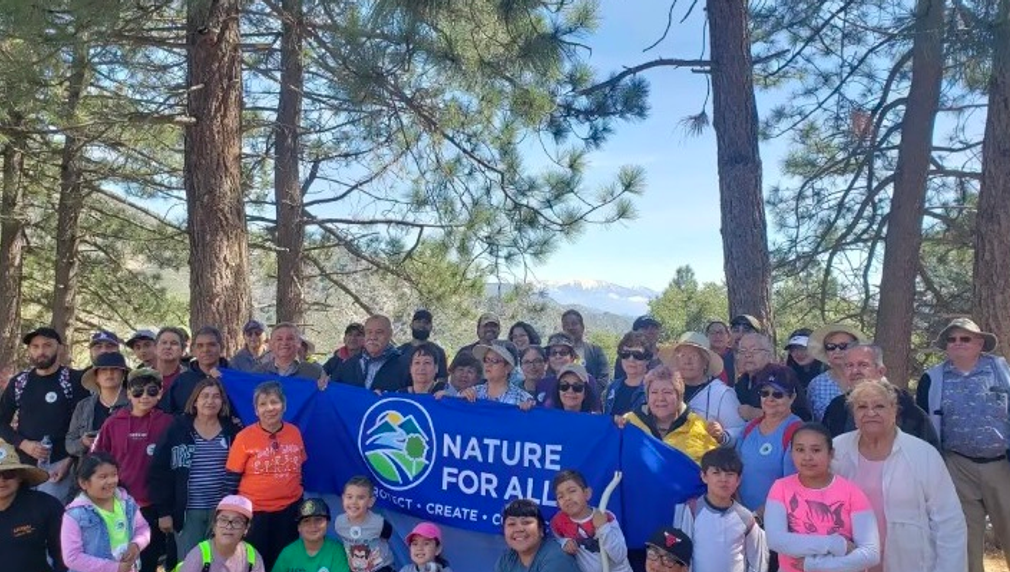Nature For All Leadership Academy
Nature for All's Leadership Academy is designed to improve participants’ understanding of environmental issues that affect their neighborhoods, including climate change, water resiliency, and the role of protecting public lands and natural resources in reducing exposure to pollution. The program will also prepare participants to engage in decision-making processes that affect their communities.

What is the primary issue area that your application will impact?
Green Space, Park Access, and Trees
In which areas of Los Angeles will you be directly working?
East LA
San Gabriel Valley
San Fernando Valley
South LA
County of Los Angeles
In what stage of innovation is this project, program, or initiative?
Expand existing project, program, or initiative
What is your understanding of the issue that you are seeking to address?
Inequitable access to the outdoors is a pervasive issue throughout the state. People of color in the Los Angeles region, particularly Black and Hispanic residents, and low-income people face more barriers to accessing nature than do white people. According to the County Department of Parks and Recreation, Los Angeles has a median of 3.3 acres of park space per 1,000 people, well below the median of 6.8 acres per 1,000 people in other high-density U.S. cities. Across the county, 41 of the 262 neighborhoods have less than 1 acre of park space per 1,000 people- and many of them are low-income communities of color. Ensuring that all people have access to parks and outdoor programming is a critical way to increase positive effects on health and quality of life for those who live in the Los Angeles region. At Nature for All, community members gain access tp and knowledge of the importance of clean, safe, open outdoor green spaces.
Describe the project, program, or initiative this grant will support to address the issue.
Nature for All's Leadership Academy incorporates tours of the LA River watershed with a drive to the San Gabriel Mountains, back down the watershed and explore local parks along its banks that allows participants to understand how all programs connect (Water, Parks and Public Lands), and experience how our water travels from the mountains to one’s home. Curriculum topics include: ● History and Habitat of the Los Angeles River: Indigenous History and Cultural Importance ● The Water Cycle and Water Resilience ● Access and Protection of Public Lands/Natural Areas ● Greening our Communities: Flora and Fauna of the River ● Civic Engagement and Public Speaking ● Community Organizing: Theory and Practice ● Climate and Environmental Justice ● Careers in Conservation: Guest Speakers from Nonprofit/Government/Private industries ● Community Project Development and Management The Leadership Academy identifies and trains a deep bench of community stewards and ambassadors on the issues of parks, water, and access focused in the most park poor low income communities of color in the San Fernando Valley, South East/ELA and San Gabriel Valley. Nature for All implements this work by training community leaders and providing them with tools and skills to keep abreast of, and take action on opportunities to improve their quality of life with respect to parks, public lands, and access to outdoor space.
Describe how Los Angeles County will be different if your work is successful.
By participation in the programs, community members will understand what it means to be an environmental steward in the community. Program participants will have an increased knowledge about the LA and San Gabriel Rivers, its tributaries and how these interrelate with Public Lands, the Angeles Forest/San Gabriel Mountains; Parks and Climate Resiliency. They will learn about Los Angeles’ green spaces and be inspired to incorporate natural spaces into their lives and to want to learn how to advocate for increased local green space development, protection of nature, and more public transportation to the larger natural areas around Los Angeles for the future.The community members that participate in these programs become local advocates in their communities and learn more about the local funding sources, their elected officials and the various agencies that help shape and determine their quality of life.
What evidence do you have that this project, program, or initiative is or will be successful, and how will you define and measure success?
More than 770 participants have completed leadership training, many continue to make a difference through increased environmental awareness and activism. Participant feedback to our workshops is overwhelmingly positive and demonstrates both increased subject matter knowledge and an increased desire and confidence around implementing learning. Nature for All provides a curriculum about water resiliency and other topics to at least 20 participants in one year. Nature for All provides training and volunteer hours for at least 20 Leadership Academy alumni who will receive their California Naturalist certifications, develop educational and activity programming and serve as interpretative guides in their community. Topics for our Leadership Development workshops include civic engagement, public speaking, organizing strategies, parks/open space,water resiliency, environmental governance, and project funding strategies.
Approximately how many people will be impacted by this project, program, or initiative?
Direct Impact: 25
Indirect Impact: 250